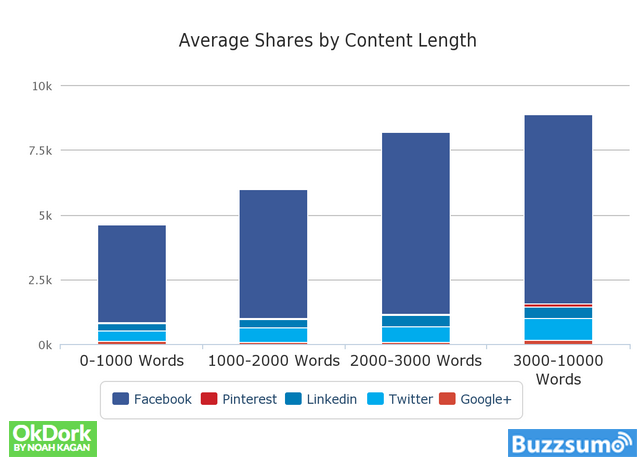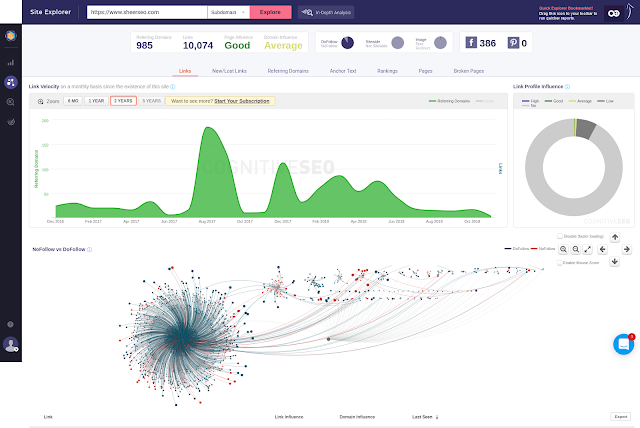There is a lot of scientific study about attention deficit and hyperactivity levels in the modern age due to the extended use of electronic devices.
Creating longer in-depth content for highly distracted users is not an easy job not even for professional journalists and scientist who, as we already know, dedicate a lot of time to research and validate their data before writing even a single idea.
The fierce competition is another problem that content marketers should address. They have to discover that sweet spot of ideal content length for their niche market.
Creating longer articles require a lot of time for the research therefore the majority of bloggers will prefer the easy way by writing 200-500 words articles. Newer studies shows that people want content that inspire them, content that answer their problem thoroughly.
Articles that are at least 1200 words long tend to rank higher, because the readers are more willing to commit into reading them. These newer studies destroy the “golden fish attention” myth which says that modern readers will glance at a web page far a couple of seconds “above the fold” - (above the fold is the first screen that loads when accessing the webpage) and will continue skimming.
Some niches require extensive research and longer articles to give the reader all the answers it needs before making the decision to convert (share the article, insert email address to get more information, insert credit card data to purchase the product or service).
Think about articles created for health market! People will find more value in longer articles, where there is a lot of information and they will convert more and share it more often.
"If the web page survives this first — extremely harsh — 10-second judgment, users will look around a bit. However, they're still highly likely to leave during the subsequent 20 seconds of their visit. Only after people have stayed on a page for about 30 seconds does the curve become relatively flat. People continue to leave every second, but at a much slower rate than during the first 30 seconds.
So, if you can convince users to stay on your page for half a minute, there's a fair chance that they'll stay much longer — often 2 minutes or more, which is an eternity on the web."
Nielsen Norman Group. (2019). How Long Do Users Stay on Web Pages?. [online] Available at: https://www.nngroup.com/articles/how-long-do-users-stay-on-web-pages/ [Accessed 17 Feb. 2019].
Here is what New York Times has to say about length of an article:
"But it turns out that readers have more exalted tastes, according to the Penn researchers, Jonah Berger and Katherine A. Milkman. People preferred e-mailing articles with positive rather than negative themes, and they liked to send long articles on intellectually challenging topics. Tierney, J. (2019). People Share News Online That Inspires Awe, Researchers Find. [online] Nytimes.com. Available at: https://www.nytimes.com/2010/02/09/science/09tier.html?_r=0 [Accessed 17 Feb. 2019].
Okdork.com made a graph where it shows that longer articles are shared more. They found that 3000-10000 words articles get the most shares.
Tips For Bloggers Who Want To Create Longer Articles Fast!
Optimize the time dedicated to research and writing articles.
Outline your article before starting to write.
If you know what you have to write your center of attention will remain on the topic which will reduce the time dedicated to this task.
For longer articles, divide the total number of words as follows:
- • Introduction: at least 200 words
- • Topic 1: at least 500 words
- • Topic 2: at least 500 words
- • Topic 3: at least 500 words
- • Discussion: at least 600 words
- • Conclusion: at least 200 words.
Do the research:
Get your reference sources online and offline before starting to write a single word on your new article. When writing lengthy articles the most time is consumed by researching, reading and taking notes from reference sources. The effective writing (which is the final part of creating a lengthy in-depth article) depends on the speed you can type all your compiled article from your hand written and electronic notes.
Download your copy of BuzzBundle and you can start searching for ideas on Twitter, Facebook, Linkedin YouTube, forums and blogs all with a single search. You only need to insert your search terms and buzzbundle will find articles related to that terms very fast.
Your sources of inspiration are now grouped together.
With BuzzBundle you can even manage your Social Media campaign on multiple social accounts. Easy posting and messaging, easy scheduling, easy brand management.
Use free websites to get inspiration for your article such as
- Amazon’s book previews: Look at chapter titles
- Google Trends: Use the explore option for your subject area
- Hashtagify.me: Look for variations of your topic areas in hashtag form
- Conference agendas: Look at the titles of keynote speeches and workshops
- Google’s “searches related to”: Located at the bottom of each search page
- Get some statistical ideas to work on your article from
- SImilarweb
- Buzzsumo
- Ahref
Start developing the ideas you wanted to convey with your article.
Well researched articles will take from couple of hours to a full day to be completed.
Don't focus on reaching the goal of high number of words written on a page fast. That can mean nothing to your reader. You can easily take random expressions from your potential keyword list, but this will increase your bounce rate which will lead to ranking lower because high bounce rate is a trigger signal for search engine algorithms that the site has a very thin poor content.
Get into the writing mood! Remove any distractions online and offline!
Arrange your creative space in such a way that will help you be inspired. Make your room distraction free (shut down your tv, close the windows to keep the street noise as far as it can be).
Don’t waste time on checking funny pages during the writing of your articles because this will break your focus and you will waste important ideas that tend to link together when working without constant interruptions.


































